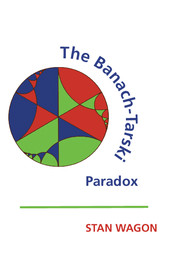Book contents
- Frontmatter
- Contents
- Foreword by Jan Mycielski
- Preface
- Preface to the Paperback Edition
- Part I Paradoxical Decompositions, or the Nonexistence of Finitely Additive Measures
- Part II Finitely Additive Measures, or the Nonexistence of Paradoxical Decompositions
- Chapter 9 Transition
- Chapter 10 Measures in Groups
- Chapter 11 Applications of Amenability: Marczewski Measures and Exotic Measures
- Chapter 12 Growth Conditions in Groups and Supramenability
- Chapter 13 The Role of the Axiom of Choice
- Appendix A Euclidean Transformation Groups
- Appendix B Jordan Measure
- Appendix C Unsolved Problems
- Addendum to Second Printing
- References
- List of Symbols
- Index
Chapter 12 - Growth Conditions in Groups and Supramenability
from Part II - Finitely Additive Measures, or the Nonexistence of Paradoxical Decompositions
Published online by Cambridge University Press: 05 August 2012
- Frontmatter
- Contents
- Foreword by Jan Mycielski
- Preface
- Preface to the Paperback Edition
- Part I Paradoxical Decompositions, or the Nonexistence of Finitely Additive Measures
- Part II Finitely Additive Measures, or the Nonexistence of Paradoxical Decompositions
- Chapter 9 Transition
- Chapter 10 Measures in Groups
- Chapter 11 Applications of Amenability: Marczewski Measures and Exotic Measures
- Chapter 12 Growth Conditions in Groups and Supramenability
- Chapter 13 The Role of the Axiom of Choice
- Appendix A Euclidean Transformation Groups
- Appendix B Jordan Measure
- Appendix C Unsolved Problems
- Addendum to Second Printing
- References
- List of Symbols
- Index
Summary
In this chapter we shall present some interesting connections between the amenability of a group and the rate of growth of a group, that is, the speed at which new elements appear when one considers longer and longer words using letters from a fixed finite subset of the group. This approach to amenability sheds light on a basic difference between Abelian and solvable groups. Both types of groups are amenable, but their growth properties can be quite different. This will explain why there is a paradoxical subset of the plane (Sierpiński-Mazurkiewicz Paradox, 1.7), but no similar subset of R1.
The study of growth conditions also elucidates the amenability of Abelian groups. One may prove quite simply (without the Axiom of Choice) that an Abelian group is not paradoxical (12.8), but the proof that Abelian groups are amenable (10.4(b)) is more complicated. One can then obtain an alternate proof of 10.4 (b) by applying Tarski's Theorem (9.2).
We shall also discuss some recent work on the cogrowth of a group, a notion that refines the idea of the growth of a group. This leads to a striking and important characterization of amenable groups, a characterization that is central to the proof of Theorem 1.12, which constructs a group in NF\AG.
The notion of amenability of a group is based on the existence of a measure of total measure one. But we are often interested in invariant measures that assign specific subsets measure one.
- Type
- Chapter
- Information
- The Banach-Tarski Paradox , pp. 188 - 206Publisher: Cambridge University PressPrint publication year: 1985



